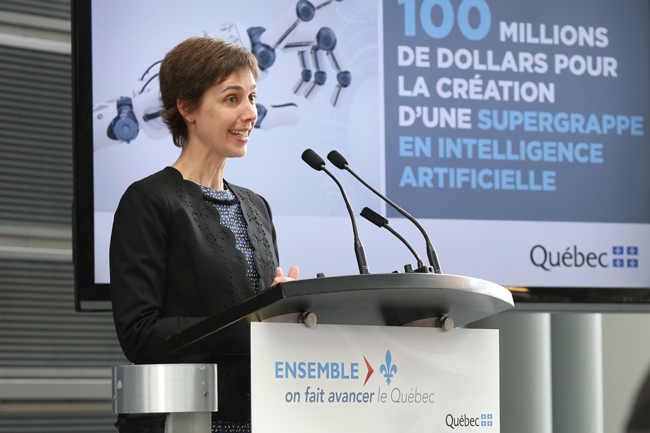
Leading academic institutions and businesses form new committee to create a strategic plan to further the development of Artificial Intelligence
By McGill Reporter Staff
At a news conference earlier today (May 15, 2017), it was announced that the Quebec government is investing $100 million over the next five years to plan how to make Quebec a world leader in Artificial Intelligence (AI).
At the conference, presided over by co-director of McGill’s Reasoning and Learning Lab, Joëlle Pineau, Premier Philippe Couillard announced the creation of a blue ribbon 12-member orientation committee co-chaired by Pierre Boivin, president and CEO of Claridge, and Université de Montréal rector Guy Breton. The committee will develop the strategic plan for a pan Quebec Artificial Intelligence Hub. “We have the talent, we have the savoir-faire,” the premier told a gathering of media and stake holders.
“In Quebec, as elsewhere in the world, the 21st century will witness a wave of deep-seated changes whose scope we are only beginning to grasp. In this context, Quebec must participate in this new economy and knowledge-based society and turn new challenges into opportunities,” continued Premier Couillard. “The establishment of a cluster will position Montréal and Québec City even more advantageously as leading economic and scientific hubs in respect of research, training, technology transfers and the creation of value-added products in the artificial intelligence sector. Together, we will continue to transform Quebec.”
The new committee will help promote research and innovation in the field of artificial intelligence, as well as the creation of related businesses, to consolidate Montreal and Quebec as an international centre of AI. Couillard said that the Hub will help Quebec and Montreal to position themselves as a world-leaders in scientific and economic centres for research, training, and in the creation of high technology products in the artificial intelligence sector.
“Quebec firms must rely on innovation to bolster their productivity and competitiveness at the international level,” said Dominique Anglade, Minister of Economy, Science and Innovation and Minister responsible for the Digital Strategy. “Artificial intelligence is a decisive factor that will affect ways of doing business and the business models of companies. Innovations stemming from artificial intelligence will change society as a whole.”
Montreal is a world leader in research in Artificial Intelligence, with over 150 researchers at McGill and Université de Montréal.
The Hub will train, attract and keep the best talents in AI in Quebec. It will create a business environment in which start-ups, and small businesses in AI will grow and thrive in collaboration with each other. It will also study and assess the ethical and social impact of AI technologies on people.
McGill will be represented on the committee by Martha Crago, incoming VP for Research and Innovation. Doina Precup, Associate Professor of Computer Engineering, will also participate as an observer.
The following are just some of the AI projects currently underway at McGill:
- McGill’s AI experts and their students are already collaborating with professors and companies from across Quebec and Canada to apply their research for social benefits, with a particularly emphasis on healthcare. In collaboration with partners at the Institut de Recherche Clinique de Montréal, they are developing an artificial pancreas which learns to calibrate the dosage of insulin that must be delivered, based on real-time readings of blood sugar levels.
- Working with researchers and doctors from hospitals across Montreal, Precup is using her AI research to helping deliver better radiation therapy for cancer patients, control epileptic seizures, improve outcomes for patients with major depressive disorder and monitor premature babies. She is also the associate scientific director of McGill’s Healthy Brains for Healthy Lives, a research initiative recently awarded $84 million by the Canada First Research Excellence Fund of the federal government.
- The lab of McGill’s Joëlle Pineau is developing an AI wheelchair that combines robotics and artificial intelligence to give disabled people more autonomy and increase their safety.
- Professor Geza Joos’ work on the Smart Electrical Grid and Micro Grids, in collaboration with Hydro Quebec, aims to quickly fix, or even prevent power failures, and to better utilize renewable power such as solar and wind.
- AI is also being used at McGill in the analysis of topic bias in culture in Professor Andrew Piper’s lab .txtLAB.
